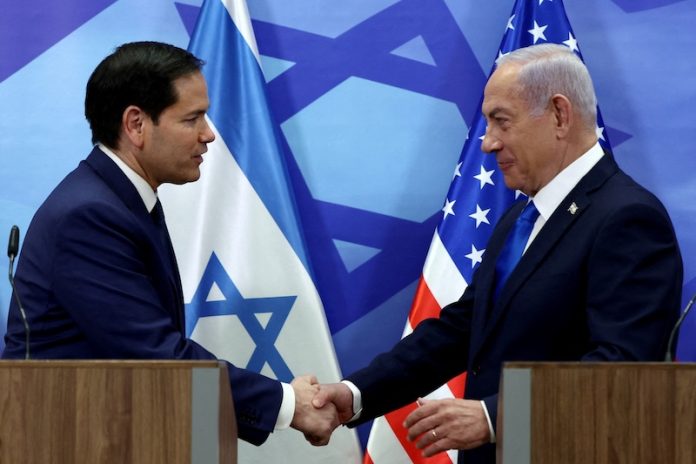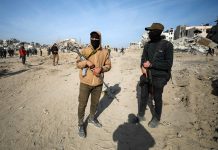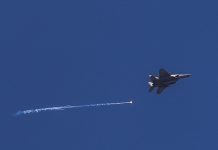
By James Mackenzie and Menna AlaaElDin
JERUSALEM, Feb 16 (Reuters) – Israel and the United States are determined to thwart Iran‘s nuclear ambitions and its influence in the Middle East, Israeli Prime Minister Benjamin Netanyahu said on Sunday after meeting U.S. Secretary of State Marco Rubio.
Speaking after meeting Rubio in Jerusalem, Netanyahu said they discussed a number of issues, “none more important than Iran“.
“Israel and America stand shoulder to shoulder in countering the threat of Iran,” he said. “We agreed that the ayatollahs must not have nuclear weapons and also agreed that Iran‘s aggression in the region must be rolled back.”
Rubio said: “Behind every terrorist group, behind every act of violence, behind every destabilising activity, behind everything that threatens peace and stability for the millions of people that call this region home is Iran.”
Israeli-Iranian enmity stretches back decades through a history of clandestine wars and attacks by land, sea, air and cyberspace.
Iran, which says it is enriching uranium for peaceful purposes, has also backed groups across the Middle East that describe themselves as the “Axis of Resistance” to Israel and U.S. influence in the region. Iran‘s mission to the United Nations in New York did not immediately respond to a request for comment.
The Axis includes not only Hamas, the Palestinian group that ignited the Gaza war by attacking Israel in October 2023, but also the Hezbollah movement in Lebanon, the Houthi movement in Yemen, and various Shi’ite Muslim armed groups in Iraq and Syria.
Iran denies that it closely directs its proxies in their attacks, saying that they act on their own initiative.
Over the 16 months since the Gaza war started, Israel has assassinated top leaders of Hamas and Hezbollah and Israel and Iran have exchanged limited retaliatory attacks.
Netanyahu said Israel had dealt a “mighty blow” to Iran since the start of the war in Gaza and said that with the support of U.S. President Donald Trump, “I have no doubt we can and will finish the job.”
Thanking Rubio for backing Israel’s policy in Gaza, Netanyahu said Israel and the United States under Trump shared a common strategy in the Palestinian enclave, where a fragile ceasefire is in effect.
“I want to assure everyone who’s now listening to us, President Trump and I are working in full cooperation and coordination between us,” he said.
The previous evening, Israel took delivery of a consignment of MK-84 heavy bombs after Trump lifted a block placed on them by the previous administration of President Joe Biden.
Iran Says It Can Build New Nuclear Facilities if Enemies Strike
CRAFTING SYRIA STRATEGY
Rubio added: “Hamas cannot continue as a military or government force and as long as it stands as a force that can govern or administer or a force that can threaten by use of violence, peace becomes impossible.”
For the moment, however, the White House is still working on extending the 42-day ceasefire into a second phase, Trump’s special Mideast envoy Steve Witkoff said, with Israel’s security cabinet due to meet on Monday to discuss the issue.
During the first phase, Hamas agreed to release 33 Israeli hostages, including women, children and older men, in exchange for hundreds of Palestinian prisoners and detainees held in Israeli jails, while Israel agreed to pull its forces back from some of their positions in Gaza.
So far 19 Israeli hostages have been released, in addition to five Thai hostages returned in an unscheduled handover and protesters in Israel have held rallies demanding that the ceasefire continue until all the hostages return.
Israel launched its assault on Gaza after Hamas fighters stormed southern Israel, killing 1,200 people and taking more than 250 hostages, according to Israeli tallies.
More than 48,000 people have been killed in Gaza, according to Palestinian health officials. Much of the enclave has been laid waste and most of the territory’s 2.3 million prewar population has been displaced multiple times, humanitarian agencies say.
Trump has angered the Arab world and surprised the United States’ allies by declaring that the United States will take over Gaza, resettle its Palestinian inhabitants and redevelop it into an international beach resort.
His ambitions have fuelled Palestinian fears of a repeat of the 1948 “Nakba”, or catastrophe, when hundreds of thousands were dispossessed of their homes in the war at the birth of the state of Israel.
Rubio described Trump’s plan as “not the same tired ideas of the past, but something that is bold … and something that frankly took courage and vision in order to outline”.
“It may have shocked and surprised many but what cannot continue is the same cycle where we repeat over and over again and end in the same place,” he said.
Arab states are working to present an alternative vision for Gaza, which was plagued by poverty and unemployment even before the war between Israel and Hamas erupted.
Rubio was cautious on the subject of Syria, which was torn apart by a civil war and will need billions of dollars to rebuild after the fall of Syrian President Bashar al-Assad, a close ally of Iran.
Assad was toppled by rebels led by Islamist Ahmed al-Sharaa, a former al Qaeda affiliate and leader of Hayat Tahrir al-Sham.
Sharaa was declared president for a transitional phase in late January, tightening his hold on power less than two months after he led a campaign that toppled Assad.
“While the fall of Assad is certainly promising and important, if Syria replacing one destabilising force for another, it’s not a positive development,” Rubio said.
“This is something we will watch very carefully as we seek to craft our own strategy in regards to how to approach the events in Syria.”
https://kayhanlife.com/news/middle-east/syria-says-it-is-seeking-clear-policy-from-iran-and-russia/













